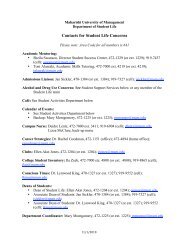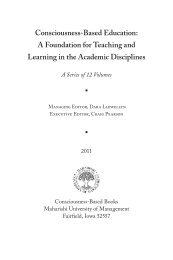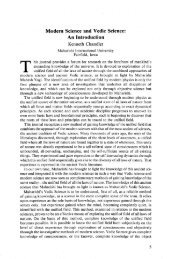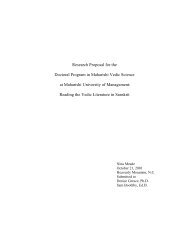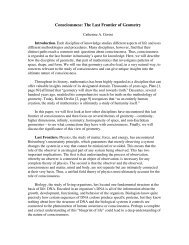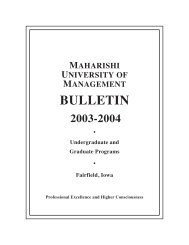The Bhagavad-Gita: A Case Study in Vedic Psychology - Maharishi ...
The Bhagavad-Gita: A Case Study in Vedic Psychology - Maharishi ...
The Bhagavad-Gita: A Case Study in Vedic Psychology - Maharishi ...
You also want an ePaper? Increase the reach of your titles
YUMPU automatically turns print PDFs into web optimized ePapers that Google loves.
MODERN SCIENCE AND VEDIC SCIENCE<br />
In comment<strong>in</strong>g upon this verse, <strong>Maharishi</strong> (1967) describes the enlightened man:<br />
... his state is like that of an ever-full and steady ocean. This, be<strong>in</strong>g the state of absolute<br />
bliss, is the goal of all desires <strong>in</strong> life.<br />
Desires arise from a particular want, from a lack of happ<strong>in</strong>ess; the m<strong>in</strong>d is ever seek<strong>in</strong>g<br />
a field of greater happ<strong>in</strong>ess. Thus desires are always flow<strong>in</strong>g towards eternal bliss-consciousness,<br />
as rivers to the ocean.<br />
Once bliss-consciousness is permanently atta<strong>in</strong>ed, desires have served their purpose and<br />
therefore crav<strong>in</strong>gs do not arise. This is a state of true contentment, a state of last<strong>in</strong>g peace.<br />
... However, this does not mean that <strong>in</strong> order to atta<strong>in</strong> peace <strong>in</strong> life a man should cease to<br />
desire and to aspire. It is the desires that lead a man to greater happ<strong>in</strong>ess and to fulfillment—<br />
not the control and kill<strong>in</strong>g of desires, which has been widely advocated through the ages....<br />
Th<strong>in</strong>k<strong>in</strong>g that to desire and to aspire will not lead to peace, people beg<strong>in</strong> to absta<strong>in</strong> from<br />
enterprise and cease to open the gates of progress. This is simply a wrong understand<strong>in</strong>g of<br />
the Lord's teach<strong>in</strong>g.<br />
<strong>The</strong> verse shows Arjun very clearly that the Self-awareness of the realized is like an<br />
ocean, which will accept any stream of desires and will satisfy it without be<strong>in</strong>g affected.<br />
<strong>The</strong> ocean accepts the river as it comes and denies no stream rush<strong>in</strong>g <strong>in</strong>, yet its status<br />
rema<strong>in</strong>s unaffected. Such is the state of established <strong>in</strong>tellect, which cannot be affected by<br />
anyth<strong>in</strong>g. It is a state of eternal peace. (pp. 170-171)<br />
In summary, <strong>Maharishi</strong>'s <strong>in</strong>sight <strong>in</strong>to Lord Krishna's analysis of suffer<strong>in</strong>g is that <strong>in</strong> a<br />
world of change and diversity, undue attachment to chang<strong>in</strong>g sources of pleasure gives<br />
rise to suffer<strong>in</strong>g through sorrow or conflict. He proposes that freedom from suffer<strong>in</strong>g is<br />
based on stable <strong>in</strong>ner fulfillment and peace. This <strong>in</strong>ner fullness is cultured through the<br />
experience of transcendental consciousness.<br />
<strong>The</strong> <strong>Bhagavad</strong>-<strong>Gita</strong> on the Experience of Transcendental Consciousness<br />
As elaborated by <strong>Maharishi</strong> (1967), Lord Krishn describes the experience of the field<br />
of pure or transcendental consciousness as one's <strong>in</strong>nermost Self. His strategy for teach<strong>in</strong>g<br />
Arjun about transcendental consciousness is to provide Arjun first with an <strong>in</strong>tellectual<br />
understand<strong>in</strong>g of the nature of the transcendental field and then with direct experience<br />
of it. He beg<strong>in</strong>s with a description that allows Arjun to realize that there is<br />
someth<strong>in</strong>g to be ga<strong>in</strong>ed beyond the range of his usual experience.<br />
Lord Krishn first describes the field of transcendental consciousness, the unified<br />
field of natural law, <strong>in</strong> several verses which follow <strong>in</strong> close succession:<br />
Know that to be <strong>in</strong>deed <strong>in</strong>destructible<br />
by which all this is pervaded. None<br />
can work the destruction of this<br />
immutable Be<strong>in</strong>g.<br />
(II. 17)<br />
112



